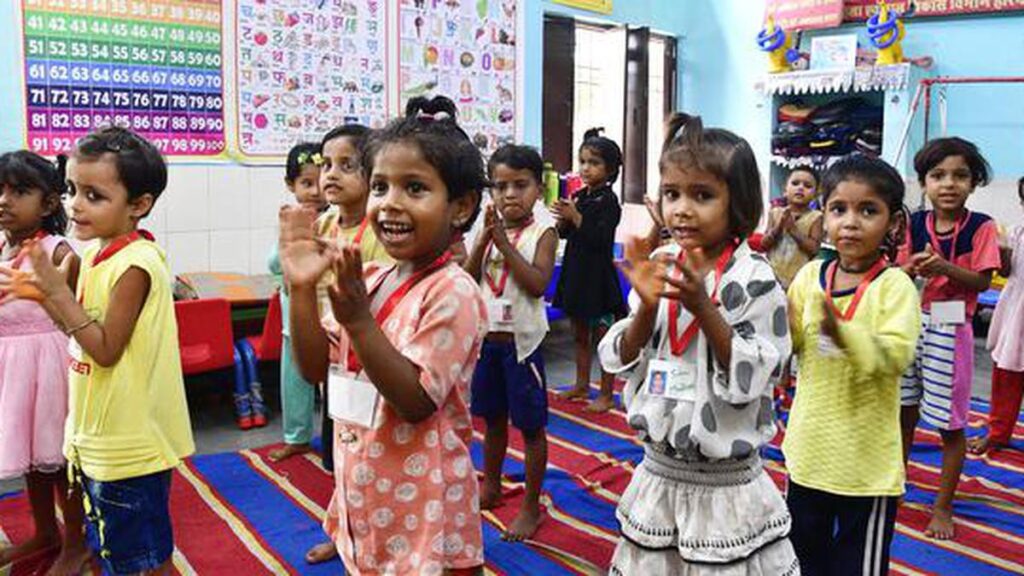
Every year, millions of parents enroll their children in early childhood education programs. These programs vary widely with different philosophies, curriculum and pedagogy. Parents often wonder why young children need to be enrolled in preschool. Some assume their kids are only learning the names of the letters or numbers–concepts they feel they could easily teach on their own. However, a wealth of recent research points to a great need for mental stimulation between the ages of 2 to 5, as this is when children make the greatest gains in learning. 10% of India’s population is in the age group of 0-5 years. Studies shows that if children are enrolled in early childhood education programs, the overall economy will be boasted by a more skilled workforce with higher earnings. If all adults have a kick-start through high-quality early childhood education, our entire society benefits.
1. Socialization:
Socialization with people other than the child’s family in a safe environment is an essential foundational element to the below areas. We intuitively understand that it’s important to introduce children to other children and support their transition into their own friendship groups. The earlier we do this, the better, as it helps children overcome shyness and gain self-confidence.
2. Concept of Cooperation:
Learning how to share, cooperate, take turns and persevere within a safe learning environment, guided by professionals who have the children’s best interests at heart. This is especially important for the first child, who may not be used to sharing with their siblings at home – while it can be a difficult lesson, it’s so crucial to learn it early.
3. Encouraging Holistic Development:
The approach taken to build a strong foundation for a child’s emotional, social, physical and mental development, which will prepare them for a lifetime. The educators are trained in identifying areas where support is needed for each child and building programs and activities around these. Their peers are also extremely important in this regard, as preschoolers are usually helpful, cooperative and inclusive.
4. Enthusiasm for Lifelong Learning:
Lessons will be given in a fun and exciting way that will encourage children to be effective learners. We inspire a thirst for learning with eagerness and enthusiasm. Love of education- for reading, learning, discovery, nature- takes root at pre-school.
5. Convey the Value of Education Through Experience:
Grasping the value of learning and education by setting an example as role models and by providing actual experiences. While parents will always be the most important influence on a child’s early life, introducing them to a preschool environment provides them with a new perspective on the importance of education that will remain with them throughout their schooling journey. It also demonstrates that you value their education highly.
6. Respect:
Teaching the value of respect for others. This is not limited to people and belongings, but can also mean respect for their environment, both immediate and global. There is no better place to learn this virtue than in a hectic preschool environment, where everything is shared and civility and manners are both taught and learned organically.
7. Teamwork:
Demonstrating and instilling the importance of teamwork that can teach respect for the opinions of others, listening, cooperation and equality. Many preschool activities are centered around teamwork for this very reason; a person who learns how to work in a team at an early age will ultimately be more socially attuned and more employable!
8. Resilience:
It’s important that early childhood educators and parents work together to develop resilience in children as early as possible. By creating a consistent, secure and fair social environment, with clear expectations and predictable consequences, children can develop skills in managing themselves and their emotions. It’s a teacher’s job to provide a challenging environment where children can learn through first hand experiences. They may experience bumps, bruises or losing a game from time-to-time, but this is the foundation for building coping strategies for greater challenges in life.
9. Concentration:
During preschool years, children explore at every opportunity to discover new experiences, new friends and new environments. Their minds are so lively and imaginative. As early childhood educators we need to balance this zest with the ability to listen, follow directions, attend to tasks and participate in group activities to develop the critical life skill of concentration.
10. Patience:
Every day as adults, we encounter situations where our patience is tested. Children need opportunities to be involved in an abundance of social experiences, where they can explore and practice the social skill of patience. By teaching through examples, role modeling and social experiences, children are able to develop their patience and learn to wait for their turn. Examples from the preschool setting include sharing a teacher’s attention, a toy, the playground or waiting in line for a game.
12. Confidence and Self-Esteem:
A strong sense of wellbeing provides children with confidence, optimism and self-esteem which will encourage children to explore their talents, skills and interests. Positive interactions with other children and teachers will promote a positive, healthy and secure view of themselves that will allow them to approach situations and problems confidently throughout their lives.
13. Exposure to Diversity:
Valuing difference and diversity are crucial to a child’s early development. Early childhood education serves to guide children to appreciate and accept differences and become well-rounded contributors to society. It is important that children understand that everyone is unique and special in their own way with their own culture, beliefs and ethnicity. Preschool is so much more than playing. While the basic educational benefits of preschool (such as literacy and numeracy) are tangible, the advances children achieve towards becoming well-rounded individuals are truly invaluable.
Leave a Reply